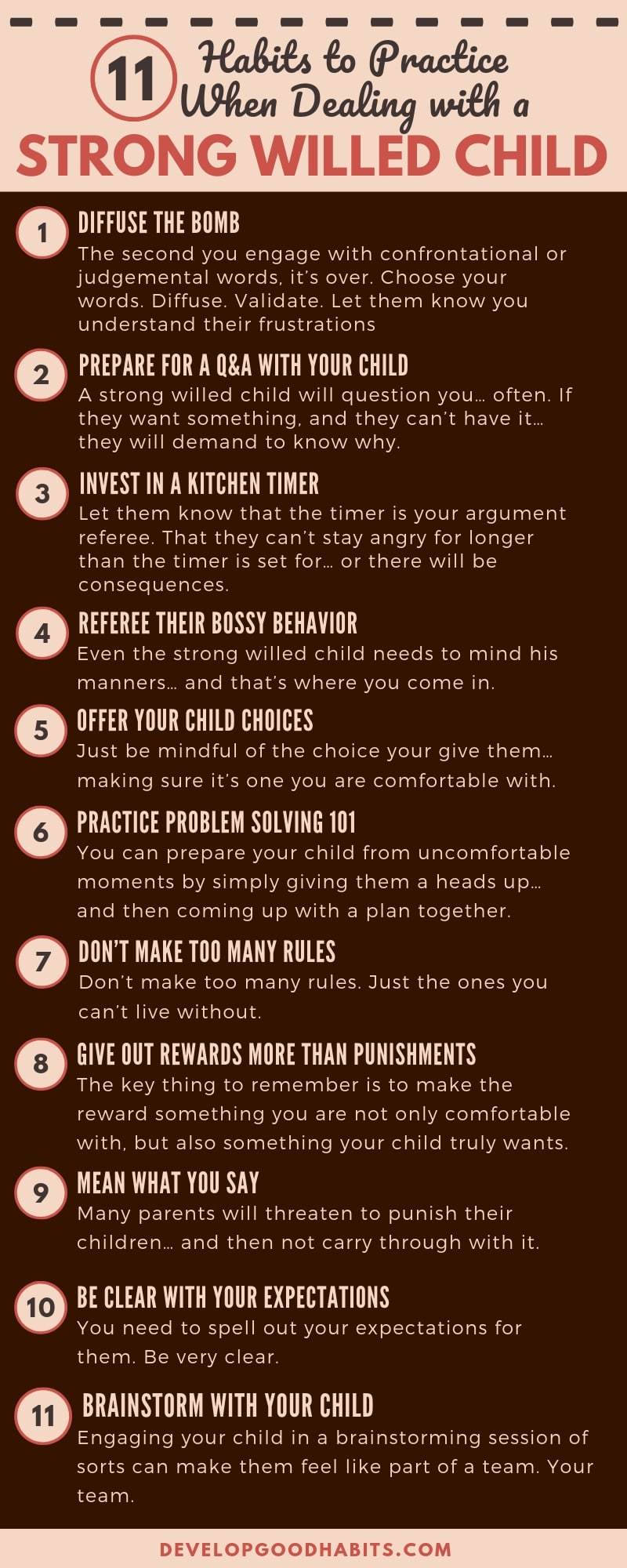Imagine this…
You’re sitting on a park bench… sun shining bright, warm against your face.
The air is crisp.
Birds are chirping.
Squirrels chasing one another.
A group of parents are pushing their children on swings, others are going down slides.
It’s the very definition of peaceful.
And then it happens…
A high pitched scream, “no!”
Shrills…
Red faces, kicking…
More screaming…
“I don’t want to!”
Someone’s strong willed child is exercising their voice.
The parent is flustered.
And you’re honestly just grateful it’s not your kid…
At least not today.
If you’re a parent reading this… chances are, you can relate.
We’ve all been there.
Some call these episodes temper tantrums.
And I suppose they are.
But being mindful of your child’s personality can help you to better understand the reasons behind their actions.
If you have a strong willed child, they may not always be so quick to do as they are told.
They may not always listen.
They may not always agree with you.
Whatever their age, a strong willed child will challenge you.
Tantrums will turn into flat out insubordination and sassing as they grow older.
These moments will turn your hairs gray.
It’s inevitable.
There will be days you want to scream.
Crawl under a rug and hide.
Walk away.
For me, it’s going for a run or hitting a heavy bag.
Stepping outside for a deep breath.
Pouring myself a drink after they’ve gone to bed.
Maybe a little earlier even.
Don’t judge me.
You will handle it your own way… whatever that is.
Whatever works.
But don’t worry…
There’s good news.
A bright side.
Hint: it’s me!
I can help you identify ways to cope with your strong willed child.
In this article, I will first define what a strong willed child is.
I’ll then provide 11 habits you can practice regularly to help diffuse difficult situations with a strong willed child.
And by the time you’re finished reading this, you’ll be feeling pretty darn good about things.
I promise.
There is hope.
So let’s not waste time.
What is a Strong-Willed Child?
A strong willed child, sometimes referred to as “spirited”, is determined to be heard.
She yearns to negotiate.
He does not back down easily.
She doesn’t respond well to confrontation.
He doesn’t like the phrase, “because I said so.”.
These children are typically very smart.
They tend to ask a lot of questions… and, thus, demand explanations for why they don’t get their way.
It’s important to keep their unique personality traits in mind when dealing with a strong willed child.
After all, some children are not strong willed… they are just plain spoiled and will scream and shout because they know it will get them what they want.
Those parents have dropped the ball…
That or they just gave up.
But we’ll save that for my future article on discipline.
Yes, we can help them too! Hooray!
Today, however, we are focusing on you.
And your strong willed child.
The one who can be super pleasant and helpful… but also argumentative and opinionated.
The one who can be reasoned with.
The one who ultimately does not have the upper hand, but likes to pretend they have a shot at getting it.
Developing good habits on your end can help you be more productive in dealing with your strong will child.
The good news?
It’s not that hard when you think about it.
In fact, you may even be wondering why you haven’t exercised some of these habits already.
How to Deal with a Strong Willed Child
Habit #1: Diffuse the Bomb
Unlike your typical tantrum, which is typically short-lived (although feels like forever), a strong willed child tends to hold on to their anger for a bit longer.
I personally have witnessed our 7-year-old daughter get angry, scream, stomp, cry, scream again, slam doors… for over 20 minutes.
I think her record may be 32 minutes.
But who’s counting?
Ummm… every single parent on the planet!
These moments can be awful.
Down right exhausting even.
For the both of you.
So it’s in your best interest to diffuse the bomb, so to speak.
To not let the flames of your child’s anger burn out of control.
Stand your ground.
Maintain your cool.
Tread lightly.
Choose your words.
Validate their feelings.
As parents, and human beings, our initial reaction to outbursts is to argue.
It’s to say things like, “You’re overreacting!” or “Why are you being so dramatic?”
I’ve even said the words, “What is wrong with you?”.
I did.
Guilty as charged.
It was not one of my finer mom moments.
But until you’re in that situation, nobody can really understand how terribly draining it is to engage in these battles… which, by the way, are often out of the blue.
Dr. Jekyll and Mr. Hyde has nothing on your kid.
You’ll be talking calmly with your child one minute… and the next, something sets him off and he’s slamming his water cup down and stomping up the stairs.
Color your clueless.
Your instincts are to follow him and say all the wrong things.
To get to the bottom of things.
But that will only drag this out.
The second you engage with confrontational or judgemental words, it’s over.
The battle has begun.

So, instead, choose your words.
Diffuse.
Let them know you understand their frustrations… and that you are there to listen to them if they want to talk.
Then walk away.
Do not dismiss their anger.
To them, it’s very real.
They have feelings they don’t quite know what to do with.
It’s your job to listen.
Habit #2: Prepare for a Q&A with Your Child
A strong willed child will question you… often.
If they want something, and they can’t have it… they will demand to know why.
An answer like, “because that is the rule” won’t fly with these kids.
Simple “not today” or “no” answers are taboo.
Instead, try this scenario on for size.
Your child wants to have a playdate at the house with a friend on Saturday… but you have a mountain of things to do.
Cleaning.
Laundry.
Grocery shopping.
Soccer games.
Dinner with friends that evening.
Your child could care less… after all, parents are superheroes. They can do it all!
Multitask… fly.
It’s all the same thing.
So what do you do?
Your initial reaction is to look at the calendar and tell them, “It’s not a good day. Sorry.”.
Warning! Warning!
A strong will child will view this vague, curt response as an open invitation to argue.
And that argument will spiral out of control if you don’t correct it… and fast!
Try replacing “it’s not a good day” with these alternatives:
- I am looking at the calendar and our family has a lot going on that day. Let me see if I can figure something out.
- Ok. Let me reach out so-and-so’s mom and see if we can coordinate something that works for the both of us.
- I’m so glad you want to have your friend over… but we are really busy on Saturday. Would you rather play for just a few minutes? Or pick a day where you have more time to play with your friend?
Option A is honest. Direct.
But it also shows your child that you are not dismissing their request.
Option B is similar… yet it takes some of the pressure off of you, and puts it on the other child’s parent.
You’re letting your child know you’re working with her friend’s mom and dad to make things happen.
Option C shows your child that you are excited for them to play with a friend.
More importantly, it gives them a choice.
Or, the illusion of one.
Chances are, they will pick the lengthier playdate on a different day.
Sure, there’s a small probability of backfire here… but I’d wager on them choosing the latter any day of the week.
Worst case scenario, they choose the shorter playdate on Saturday… then you simply revert to the Option A or B explanations (above).
This takes a bit of the pressure off of you… placing some on the other parent as well.
It will all work out from there.
Habit #3: Invest in a Kitchen Timer
No, I’m not suggesting you start cooking in the heat of battle.
That’s just plain silly…
Although it may prove to be a nice distraction for some.
But the kitchen timer is an underappreciated gadget with so many potential uses.
Plus, they make some really cute ones now.
Penguins.
Footballs.
Minions.
Cats.
Mickey Mouse.
R2-D2.
Where am I going with this?
You’ll see.
Strong willed kids tend to be able to hold a grudge… to argue… forever.
They are in it for the long haul.
They are akin to a union on strike.
Thus, placing a time limit on arguments can go a long way.
Trust me.
When your having a good day with your child, perhaps during Taco Tuesday Night dinner, present the ol’ kitchen timer.
Purchase one that your family will find amusing…
Give it a name if you want…
I like “Gus”.
Let them know that the timer is your argument referee.
That they can’t stay angry for longer than the timer is set for… or there will be consequences.
It’s that simple.
You’ll probably need to verbally warn them as well, especially if they are younger.
Something like, “If you aren’t calm when the timer goes off, no television tonight. It’s in your hands.”.
Habit #4: Referee their Bossy Behavior
Strong willed children have a tendency to be bossy.
Now, in their defense, they likely view this behavior as them being leaders… taking charge of a situation.
But it doesn’t always come across that way.
Especially to other kids.
In fact, your strong willed child may even talk to you and other adults that way.
And that’s not cool.
It’s downright unacceptable.
Even the strong willed child needs to mind his manners… and that’s where you come in.
If, for example, you hear your child tell her younger sibling, “We’re watching my television show first!”… you may want to step in and suggest she word it differently.
Remind her that there are kinder ways to ask for something. Instead of demanding, phrase it as a question, “Would you mind if we watched my show first? I’m really excited to see it.”.
Having the conversation with your strong willed child about what it means to be respectful will go a long way when it comes to them forming relationships in the future.
Explain how other people may view a lack of pleases and thank yous as rude… and bossy.
Your smart, strong willed child should be able to make the connection and watch his words a bit more closely next time.
Or, in time.
After all, they are kids. So there’s a learning curve.
Habit #5: Offer Your Child Choices
Rarely will a strong willed child do anything they don’t want to do.
And if you try and force the situation… it will likely only escalate into an unnecessary fight, tantrum, etc.
If you need or want your strong willed child to do something, be mindful of how your phrase it.
Suppose you want them to clean up their toys in the backyard.
Instead of just saying, “Go clean up your toys,” try this: “The yard is a mess. Would you like to clean up your toys before you have a snack or after?”
Giving them a choice will make them feel in control.
They won’t feel as if they are being forced to do something, but rather as if they are making a decision to help out.
Just be mindful of the choice your give them… making sure it’s one you are comfortable with.
After all, if the yard needs to be cleaned up within the hour because company is coming by, then you may need to position your request differently.
Perhaps turning it into more of a game, like this:
“Hey, your friends are coming over soon. If you can clean up the yard in the next 15 minutes, we’ll have a piece of chocolate (ice cream, cookie, chips, etc…) before they get here! Sound good?”.
While this may come across as more of a bribe, it is still giving them a choice of sorts.
If they choose to do something for you… you’ll do something for them.
They can always say, “no thanks” to your offer… although it’s highly unlikely.
Trust me on this.
Strong willed children are still just kids, after all.
Habit #6: Practice Problem Solving 101
Another characteristic of a strong willed child is impatience.
A strong willed child hates waiting.
Waiting in line. Waiting for a movie to start. Waiting in the dentist’s office. Waiting for their food in a restaurant.
What may only be a few minutes in reality… feels like an eternity to a strong willed child.
You’ll hear a lot of complaints.
A lot of whining.
There may even be a few tears.
Some banging or stomping.
But this can be avoided by simply executing the art of problem solving.
You can prepare your child for these uncomfortable moments by simply giving them a heads up… and then coming up with a plan together that will help make the wait a bit more bearable for the both of you.
Here’s an example:
You’re going to the amusement park this Saturday.
Chances are, there are going to be lines. And, 9 times out of 10, they will have to wait for that popular ride.
Instead of just forcing them to stand there, complaining, for 30 minutes (or more)… ask them how they can make the wait easier? Fun even?
Perhaps they will choose to bring their iPod and listen to music in line.
Maybe you can play “i spy” while you wait.
Or they might want to bring a book to read.
Whatever your child chooses, it will be something they came up with.
Something they enjoy.
And this will surely help keep their mind off the lengthy wait ahead.

Habit #7: Don’t Make Too Many Rules
A strong willed child does not like rules.
Not that any child particularly likes them… but most can typically understand why they are in place.
At least most of the time.
For instance… you can explain to a child that a rule like, “no diving in the shallow end of the pool”, exists because it keeps them safe.
Or perhaps a rule such as, “no sweets before bed”, will help them get a good night’s sleep… which keeps them healthy and their mind’s sharp.
But a strong willed child… oh, the strong willed child… they just don’t care.
The rules don’t apply to them.
So… what can you do?
It’s simple.
Don’t make too many rules.
Just the ones you can’t live without.
Bedtime is always a big one.
At least in my house.
My husband and I used to have a firm stance on bedtime… that is, when we only had two children.
We used to have it locked down.
At 18 months apart, our kids pretty much went to bed at the same time.
Peacefully.
After a short story and prayers.
And then the third child came along…
Then the fourth.
And by the time the oldest turned 6… bedtime started to become a struggle.
By the time his sister was 6… bedtime because a battle.
And now that our youngest are 4 and 5 years old… bedtime is a marathon of stall tactics and mind games.
Forgetting to go to the bathroom.
Needing a drink of water.
Wanting another hug from mom or dad.
I’m scared.
I’m not tired yet.
You didn’t kiss me.
If you can live without setting a firm bedtime with your child, then don’t.
For fear of sounding like a broken record… try giving them a feeling of control, and a choice, in the matter.
Something like this:
“Your dad and I would like you in bed by 8:30pm because you have school tomorrow… and we want you to be rested and ready for your day. But if you’re not feeling tired, how about you just lay down at that time and do something quietly for a while?” .
This still gets them in bed by 8:30, like you want… while giving them the option of staying up later, which they want.
They will go to sleep when they are tired, which probably won’t be very long after.
Whether it’s the bedtime rule you’re willing to compromise on, or some other rule, the important thing to remember is this: explain to your child why the rule is in place… but that you are willing to meet them in the middle.
Your strong willed child will love being included in the rule making and, as a result, will most likely question you less on the ones you aren’t willing to budge on.
Habit #8: Give Out Rewards More than Punishments
Do not misunderstand me…
Every child needs to be punished sometimes.
Whether they are put in time out, grounded, or can’t watch tv for a day… if your child does something bad, they need to be disciplined.
But a strong willed child has a tendency to yearn for fairness.
They feel a sense of entitlement.
They often confuse wants with needs.
A strong willed child may believe they need a new video game just because their friend got it for their birthday… but they really just want it.
They often don’t understand the difference and, quite frankly, aren’t interested in your reasons for saying “no” or “not now.”.
So how do you go about getting a strong willed child to do something without commanding it?
Offer them a reward system.
Something like this:
“If you do all of your chores for one week without being asked, I’ll buy you that video game you want.”
Or for a younger child, “If you help mommy set the table, I’ll let you watch one short television show after dinner.”.
The reward system should be pre-determined ahead of time… maybe even put onto a poster or chart to give your child a tangible goal to work towards.
It could be as simple as rewarding them for reading more at night.
The key thing to remember is to make the reward something you are not only comfortable with, but also something your child truly wants.
It will give them the incentive to listen, decreasing your chances of conflict.
Habit #9: Mean What You Say
Many parents will threaten to punish their children… and then not carry through with it.
I’ve done this.
Many times.
And only recently have my husband and I started to really enforce this.
Form a unified front, if you will.
Stand our ground.
Be the bad guys.
When a strong willed child is given a warning, they will often ignore it… or pretend not to hear it.
You may tell your 5-year-old to stop running ahead of you in the crowded mall… yet, there they go!
And now you are terrified and infuriated.
You may tell them to use their quiet voice in church… yet they are talking as loud as can be to the child behind them.
You are mortified by all of the people staring at you.
The thing is, a strong willed child should be allowed to exercise their voice… but, what they can’t be allowed to do, is disrespect or disregard your warnings.
If you warn your child to stop running ahead, or else he won’t get a pretzel after you’ve finished shopping, and he still runs ahead… then he doesn’t get a pretzel!
Even if his brother and sisters get one… he doesn’t.
He can watch them all enjoy the salty, chewy goodness.
Tough.
Too bad, so sad.
A strong willed child often pushes her right to independence… but she should not view you as pushover.
That is not okay.
Empty threats will only result a spoiled child… which is far worse than a strong willed one.
Never let them actually have the upper hand.
Ultimately, you are the parent.
And what you say, goes.
Habit #10: Be Clear with Your Expectations
A strong willed child doesn’t take well to mixed messages.
They move at their own pace… beat to their own drum.
If your child has a birthday party to go to in one hour, chances are he will be ready to go in five minutes.
But tell her she has a checkup with the doctor in 30 minutes… and you’re having to practically carry her out of the house with only one shoe and no coat on.
They may even try telling you that they didn’t know it was time to get ready.
Strong willed kids are funny creatures.
And they will push the envelope, often.
Like I said, they are smart.
You need to spell out your expectations for them.
Be very clear.
Say something like, “I need you dressed and by the front door in 15 minutes.”.
Don’t leave it up to them to decide how long it takes for them to get ready.
Only aggravation will come of it.
Tip: Build in a few extra minutes for yourself if you need your child to do something that is time sensitive.
Trust me on this… a strong willed child will try their darndest to find a way to stall, especially if you’re asking them to do something they aren’t excited about. So if you need them ready in 20 minutes, tell them they’ve got 15.
You’ll thank me.
Another strategy you can use is to add structure to your day and create a morning routine for your strong-willed child to reduce a lot of the stress and anxiety that happens throughout the day. The video below provides a 6-step process you can use to create a great morning routine.
Habit #11: Brainstorm with Your Child
Another characteristic of the strong willed child is having a brain that won’t shut off.
He finds it very hard to just “chill”.
Relaxing is not relaxation for them.
Being heard is their priority.
They want their opinion to matter.
They need it to.
And you need to assure them that their voice is not falling on deaf ears.
One way to do this is to involve them in your decisions whenever possible.
Decisions pertaining to them, that is.
Here’s an example…
Say one of your child’s weekly chores is to bring his dirty clothes hamper to the laundry room… but instead he’s just making a huge pile on his bedroom floor.
Frustrated, your first instinct may be to scold your child. Threaten punishment even.
To say something like, “I’m sick and tired of picking up your dirty laundry. Go bring me the basket now or you can forget about this week’s allowance!”.
But that would be a mistake.
Instead, take a deep breath and say something like this:
“Honey, you keep forgetting to bring your dirty clothes to the laundry room… and that makes more work for me. I give you chores so that I have more time to spend with you. So how about we come up with some ideas together to help you remember?”.
It makes you seem like less of a power wielding tyrant… and more of a partner in parenting.
Yes, I used the word tyrant.
It’s good for imagery, right?
In all seriousness, there are parents out there who live by the ol’ “I’m the parent and I make the rules” mantra.
And then there are parents who believe in letting their child forge their own path, setting very few rules… rarely raising their voice.
Preachers of the old school parenting style may refer to these folks as “hippies”.
But parents of the strong willed child fall somewhere in between.
They have to in order to survive.
They need to not fear making rules, but also be willing to bend on them.
Including them in certain, but not all, decisions will save your years of grief.
Final Thoughts on Dealing with a Strong Willed Child
A strong willed child is not just challenging you for fun.
It’s in their DNA.
They are wired that way.
And this can be exhausting… for the both of you.
But as tired and frustrated as you may be, they likely have some issues they are dealing with as well… which need to be acknowledged.
Think about it.
It’s not easy being the kid that is always getting yelled at.
Or referred to as “difficult”.
Maybe your strong willed child is left out of games during recess because other kids think she’s bossy.
So she tends to navigate towards friendships she feels she can control.
In the book by Dr. James Dobson, The New Strong-Willed Child, he infers that many of these children have self esteem issues.
Dobson also believes that the strong willed child often harbors the fear that his parents will give up on him… stressing the importance of continuously reassuring the child that your love is unconditional.
Being sensitive to your strong willed child’s feelings from the start will help them grow into well-adjusted teens and successful adults, according to a study in Developmental Psychology.
Which is positive.
Although, I’m not sure you need a study to tell you that supporting your child will help them succeed in life.
The difference here, however, is that supporting a strong willed child involves a bit more patience on your part.
You need to be the Yoda to their Luke and help them channel that energy and angst into something positive… a force to be reckoned with.
Yeah… I went there.
Explain to your child that being strong willed can be a gift… even though you both may sometimes view it as a curse.
Being argumentative can be draining.
But it’s also a sign of intelligence.
Foster a sense of empathy in your strong willed child.
Help them to understand that there are consequences for our actions by explaining your reasons for things… and why certain rules are in place.
Rules affect you both.
Here’s a perfect example…
If your teenager doesn’t like your rule about leaving their cell phone in the glove compartment of the car while they are driving… explain that the rule is in place so that they aren’t tempted to text, which is a dangerous distraction.
Go on to say that it can cause an accident, which could result in them or someone else getting hurt… or worse. And that if that were to happen, your heart would be broken. That you worry about them and love them more than anything.
The rule may seem silly to a fearless teen, but by explaining how breaking that rule could adversely affect them and others, you are making them accountable.
You are forcing him to think about someone other than himself.
A strong willed child who is being raised to understand compromise will go places in life.
Wonderful places.
And, one day, they will look back and thank you for helping them get there.
For not giving up on them.
So when you’re having a rough parenting day… try and remember to think about the big picture.
See your child succeed in whatever they do.
See them lead.
See them happy.
Your hard work and persistence paid off.
It will pay off.
And if you're looking for more resources, check out these articles:
- How to Raise Successful Kids: 7 Habits to Focus On
- 11 Good Habits You Should Help Your Kids Build
- How to Help Your Child Develop Healthy Habits
Finally, if you want to level up your parenting skills, then check out this resource that will show you how to get your kids to listen WITHOUT yelling, nagging, or losing control.

Nicole Krause has been writing both personally and professionally for over 20 years. She holds a dual B.A. in English and Film Studies. Her work has appeared in some of the country’s top publications, major news outlets, online publications, and blogs. As a happily married (and extremely busy) mother of four… her articles primarily focus on parenting, marriage, family, finance, organization, and product reviews.


